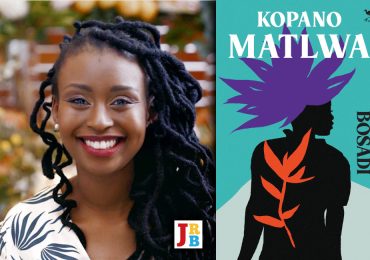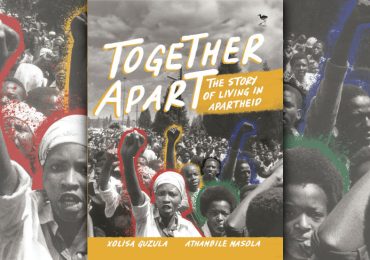Jacana Media has shared an excerpt from Hot Water by Nadine Dirks – an intimate and daring look into the life of a young African woman from the Cape Flats with a chronic illness.
Dirks is a writer, opinion-maker, activist and communications expert. Her work, interests and expertise lie in intersectional feminism, gender, sexuality. Including sexual and reproductive health and rights. She is dedicated to women’s health because of her own lived experience with endometriosis. She is an author, public speaker, moderator, and panelist. She is currently pursuing a Master’s degree in Women and Gender Studies.
About the book
Hot Water is an intimate and daring look into the life of a young African woman from the Cape Flats with a chronic illness. The book investigates how endometriosis affects the way young woman function and navigate the world, and how this becomes especially complicated for those who are underprivileged and reliant on the public sector’s healthcare system.
In Hot Water, Nadine Dirks reveals the unique issues of racism, sexism, classism, fatphobia and slut-shaming that African women experience within the context of healthcare facilities, and how especially jarring it is when the stigma comes from medical staff who one expects to have the patient’s care as their primary concern. All of this has enraged Dirks and catapulted her into becoming a sexual reproductive health and rights advocate.
Hot Water tells the story of how people with chronic illness are treated daily, at school, university and socially for being differently abled; how people are regarded as lazy, aggressive, disappointing, lacking, among multiple other things for being unwell in comparison to their healthy counterparts.
One cannot look at seeking adequate healthcare as a young, black, underprivileged woman on the Cape Flats without experiencing racism in the most blatant of ways. Even with guidelines in place, the book shows that it is next to impossible to invoke those rights even if you are aware of them for fear of being victimised and excluded from the system.
Read an excerpt:
~~~
Health, care and crisis
For girls who are, like me, from Hanover Park—a small township in Cape Town infested with gang violence and poverty—the world can seem incredibly small. It is like being within a society, within a bubble, that very little of the outside world seems to penetrate and reach. We are all born in the community day hospital, raised in the community and go to school because it is a legal requirement. Before it was a legal requirement, many did not finish even primary school, especially girl children.
Generally speaking, even then, the chances of escaping and experiencing life outside of the bubble seemed impossible, and almost laughable to even consider. You are bound to duty, poverty and Black tax. Tertiary education is seen as an aspiration for white people, not us—never us. When I was younger, it was not even a conversation—so much so that I did not even know that it was a possibility. After we finish school and try to find a job, the next step, as with the rest of the sacraments for girl children from the Flats, would be to get married, and have children—ideally in the order specified. If you switch the order up, you will raise eyebrows and be judged severely by everyone—from the priest to the neighbourhood drunkard and even the community moms.
Your worth as a girl child is seen in key things—respectability, European beauty standards, your ability to perform wifely duties and, lastly, the functionality of your womb. Even as a child, your mind is filled with ideas of motherhood, and how it is a blessing to have children. Your job is to be fruitful and multiply while relying on God to make a way. This concept always made me laugh internally although I never verbalised it—having children and relying on God to provide for them. It sounded strange to me, considering how so many people and their children were living in poverty—I didn’t understand it, and thought maybe there was a special number of children you had to have before the whole making a way thing starts to kick in. There is no margin for error, no wiggle room, no negotiation… And woe to those who are not fruitful and who do not multiply, because surely … surely … they are cursed by the Almighty with lifelong spinsterdom?
Sexual and reproductive health is taboo. We don’t talk about it at all, so it does not exist, right? You are better off assuming babies come from the mountain because asking questions about them is shameful. We don’t talk about our genitals or sex organs, we use euphemisms, even as adults, and there are no conversations about why some people’s ovens don’t work as they should, apart from the occasional community skinner about how so and-so’s husband ran off, apparently justifiably, because so-and-so’s oven was not working. Women’s worth is in their ovens and their ability to make dough rise without mishaps. And yes, by oven … I do mean uterus. To add insult to injury, there is no situation wherein it is justifiable for women to walk out on their marriages, even if the reason is something their husbands could control—unlike infertility. As a woman, you are then instructed to carry your cross. I guess it is as the saying goes on the Cape Flats: ‘Meat is meat and a man must eat.’
In the middle of winter in July 2014, when I was 19 years old, I was rushed to the hospital on my GP’s orders—he was not entirely sure what was wrong with me but knew it was dire enough to give me a letter to be seen at the emergency room at the local hospital. I was feeling feverish, nauseous, exhausted and had extreme pain—especially on the right side of my body. The nurses and hospital staff took pity on me because I looked like I was near death because of the pain. I was immediately admitted and spent the night and early morning undergoing a series of tests and scans to get to the bottom of what was causing my strange symptoms. I was then informed I was not allowed to eat—not that food was even on the agenda in that noisy, smelly and overcrowded ward. Soon thereafter, I was told that I needed to have an emergency surgery as they had located a mass on my right ovary from a scan. I was terrified and had no idea what to expect or what it could be—I had never had any kind of surgery before.
I woke up, groggy from the anaesthesia, and was back in the enormous post-surgery ward. It seemed that everything in there was in various shades of white—white linen, white uniforms, white walls. The light was unnervingly bright to me and, suddenly, my doctor appeared out of nowhere, leaning over the railings of my hospital bed. She made no attempt to prepare me, sugar-coat or even check that I was fully conscious before she started to speak. She stopped speaking, or I stopped listening, I may have slightly blacked out again and then I heard her say ‘you have endometriosis, really, really bad. It is unlikely that you will ever have children.’ I don’t remember responding, or acknowledging what she had said, and felt myself slipping back into an anaesthesia-induced stupor as her face faded away in my mind’s eye.
Even through the numbing effects of the anaesthesia, I felt a heaviness—the feeling of despair and hopelessness had already started to creep in. My entire world shattered around me, as I lay in my hospital bed attempting to physically recover while being torn apart emotionally and psychologically. It felt brutal, disheartening and inhumane. The doctor’s bedside manner, in retrospect, is one of the coldest, most violent experiences of my life. She let me know my life, as I knew it or imagined it, would never be the same again with about as much empathy and emotional range as someone ordering a coffee. I don’t suppose the need for counselling or proper emotional support is important for girls like me.
The air was sucked out of the room and everything felt thicker, darker, strained. I had no idea how I was going to survive, how my family would be able to help me gain access to the lifelong healthcare I would need, or how I was going to keep myself sane, trying to cope with being a teenager who was chronically ill. The torment of wondering how you can possibly make yourself smaller, less of a burden, how you can deal with everything on your own as a teenager is the kind of anxiety no one should have to deal with.
I woke up several hours later. Back from surgery in an unfamiliar ward, it was the middle of the night, my abdomen felt like I had been sliced open—which I later learned was what happened—and the woman in the bed next to me seemed inconsolable. I could not move to console her, and so I tried to speak to her, while attempting to alert the nurses without startling everyone else in the ward who seemed to be fast asleep. She told me that she had just miscarried and was afraid that her husband was going to leave her because it had happened before. She told me that his family were very traditional Zulu people and said that they had advised him to leave her because of her fertility issues. She was devastated. I was 19 and could not seem to find the words to fix her world—as I lay there, unable to move, groggy from morphine, and dealing with my own conundrum of my oven. How do you even begin to fix a faulty oven?
This is what the healthcare system does for us—the absolute bare minimum—not even so much as a plan to get people some necessary support and coping mechanisms. It also quickly puts things into perspective, maybe not immediately, but certainly as an afterthought, that our lives and bodies are not valued in the same way as others are. If you are lucky enough to find yourself born in the middle of an intersectional jackpot that crosses all aspects of gender, race, class and the rest, you may find your experience to be very different. Your healthcare is likely to be multi-disciplinary, involving all aspects of what you need—be it emotional support, a gynaecologist, an endometriosis specialist—and depending on where the endometriosis is located—a bowel surgeon. The privileges allotted to you become things that you are accustomed to—as easy as calling your doctor when you are feeling under the weather, scheduling appointments via email, or even getting weekly vitamin B injections for the never-ending fatigue that comes with endometriosis.
So, there I was, in my Mitchell’s Plain hospital bed, counting my sacraments to see how many I had managed to fulfil at 18.
~~~





